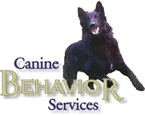Your Weekly Training Tip
January 23, 2011
For such a simple obedience command, there sure seems to be lot to consider with "coming when called". This critical foundation skill is one that causes no end of trouble for dog owners everywhere. So today, I look at one more reason dogs may fail to come when called, and what you can do about it. To me, the ideal response to a recall cue - Come, Here, or whatever you choose - is for the dog to turn and fly back to me as fast as his little paws carry carry him, the instant he's heard the cue. One thing I never want is for my dog to pause and deliberate, "hmmm, should I or shouldn't I?". One common reason for such hesitation is that, often enough, coming when called is a predictor of something less than enjoyable happening. I think most people know, at least intellectually, never to punish a dog who has come when called. Yes, that holds even if you are highly aggravated by the running, ducking, and dodging your dog did the first three dozen times you called. Punishing a dog who has correctly (even if only finally) responded to "come" is simply teaching him to not come, period. However, even experienced pet owners do not always consider the bigger picture and think fully about what associations are made when we call our dogs. Remember, dogs are brilliant at putting together sequences of events, i.e. at creating associations. So, think about it: do you ever call your dog, then clip his nails, or give him a bath? How about calling him to get put in his crate or yard before you leave for work? Do you call "come" to bring your yard-loving dog inside? How about when you want your couch potato to go outside and get some exercise? I can hear you now: But that's not punishment! But I also hear your dogs. These are all things that most dogs would rather not do. Admittedly, they may be only mildly negative. They may only make your dog a little apprehensive, or resistant, or subdued, or even just bored. And that is exactly not what I want my dog to associate with coming when called! What to do about this? Sure, you could do nothing, and figure "oh well, into every life a little rain must fall". But I'm guessing that you, too, love the mental picture of your dog doing that flying, unhesitating, completely trusting recall. What I recommend, and what I do with my own dogs, is to teach separate cues for any activities and actions that might be construed as even a little negative. For my own dogs, those cues include inside, outside, in the yard, kennel, tub, and toes. Keep in mind that every dog is different. If your dog can think of nothing more delicious than a bath and pedicure, by all means call "come" to invite her to her spa treatment. But for all other little things she doesn't consider quite so wonderful - put some new cues to 'em. Reduce the negative associations and watch your dog's recall speed right up! Till next week, Happy Training! julie
Julie Cantrell BSc, CPDT-KA, CDBC |
Free Dog Training & Behavior Tips If you enjoy our training tips, sign up here to get them in your inbox! With each issue, you'll understand your dog better, and enjoy training more! |
www.k9behaviorservices.com

